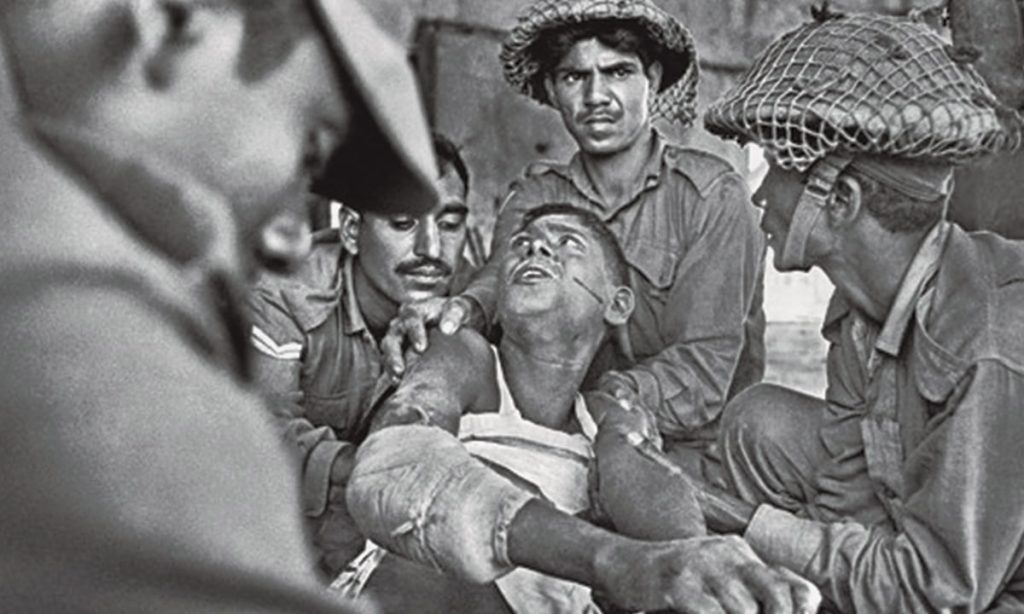It’s strange that the ghosts of genocide continue to haunt us, 48 years after our independence.
Two generations removed from the Liberation War, the story of the Liberation War, and how it was ignited is, perhaps, little different to me than other epochs in history. To the analyst’s mind, the word revolution brings up images of Louis XVI and Tsar Nicolas II before the 1952 language movement, and the word genocide conjures up events such as the Armenian and Rawandan Genocides before we talk about the genocide of 1971.
Yet the vengeful spirits born on 25th March, 1971 linger on in our collective unconscious, their mangled visages and crumpled pride serving as stark reminders that this happened, in our country, merely four decades ago. It’s as visceral a reminder as the PTSD flashbacks that plague rapes survivors, instantly transporting their minds and bodies to those moments of sheer horror, where your life and honor were stripped with machine-like efficiency by people who were, by all accounts, the very men sworn to protect your life from the threat of foreign invaders.
The road to 25th March was paved with many pitstops, that stretched from the 1952 Language Movement through the General Election of 1970, where Awami League won majority control, capturing 167 out of 313 seats. Zulfikar Ali Bhutto of the Pakistan People’s Party (PPP) coerced Yahya Khan to postpone the national assembly in March, which Awami League responded to with a bold non cooperation program, declared in the historic rally on March 7th. While anti-West Pakistan sentiments were running at an all time high in East Pakistan, the powers that be were finishing up the plans for Operation Searchlight.
The thoroughness and precision of Operation Searchlight, drawn up by Major General Khadim Hussain Raja, GOC 14th Division, and Major General Rao Farman Ali, is something to behold.
Seven points of focus were outlined, which talked in comprehensive fashion how the political, educational and cultural capital of East Pakistan were to be rounded up and categorically neutered. According to Yahya Khan, if West Pakistan killed three million Bangalis, the rest of us would eat out of their hands.
This speaks to the depths of depravity that men can steep to, once they stop seeing their compatriots as humans and see them as targets to be knocked down in single file.
To this day, Pakistan mourns the loss of East Pakistan, which marked the end of the dream known as United Pakistan. But did they truly value us?
Does it not seem like East Pakistan was always the other, the disadvantaged motherland of a people who spoke a different language, always to be oppressed, plundered and pillaged, from here to eternity?
What’s the value of an United Pakistan, where one part of the country stands triumphant over the vanquished form of the other, the boot heel of our oppressors crushing our larynxes ever so slightly, robbing us of our will to survive, to struggle and to thrive?
Put simply, East Pakistan was an economic prize to be hoarded by West Pakistan, the way one covets a piece of property devoid of life and sentiment. We were afforded the same respect that the Kauravas afforded to Draupadi, who was gambled away by Yudhisthir in a rigged game of dice. Like the Kouravas of old, they thought that our motherland, and all who live within, were slaves to the whims of West Pakistan and its rulers. Whims that include an unjust forcing of a foreign language into the mouths and hands of near 70 million people.
And like the case of Draupadi, who defended her honor in a male-dominated royal court, East Pakistan launched a long running slew of nationalist campaigns, asking for better representation and acknowledgement that put them on equal footing with the citizens of West Pakistan.This basic act and demand for respect and humanity was seen as a rebellion to be squashed out, like one squashes an ant without consideration.
When Draupadi was disrobed, Krishna intervened to save her honor and made the sari she was wearing get longer the more Duhshashana pulled on the hem of her garments. Unfortunately, we received no such saving grace.
Our motherland was assaulted at nine different points, resulting in 10,000+ deaths. The death of 300 Biharis in Chittagong riots earlier in the month were retroactively used as a reason for the crackdown.
The genocide of March 25th was carried out, in part, to also prevent the independence of Bangladesh. But the wound it inflicted on our national pride made the act a self-fulfilling prophecy. Perhaps we would have broken away from West Pakistan sooner than later. Whatever the case, it is good that this separation occurred rather than both regions remaining engaged to each other in unholy matrimony.
Like Draupadi, who untied the knot of her hair and vowed to seek revenge for all who had assaulted her honor, Bangalis who survived the nightly onslaught awoke to face dawn with two goals in their minds: the fight for independence, and the fight for victory.
“Why did you initiate the genocide in Dhaka?”, a journalist asked Tikka Khan afterwards, to which he replied there was no genocide. “Some terrorists were making preparations at the Jagannath Hall to attack the patrol force with firearms. After that, I sent some forces to Jagannath Hall. It is true that some Hindus died on the occasion. When two groups fight or are in a combat, it can’t be called genocide.”
Truly, the brush of history and its magical powers are fascinating and frightful to behold.
